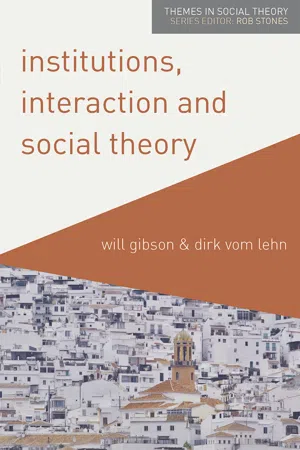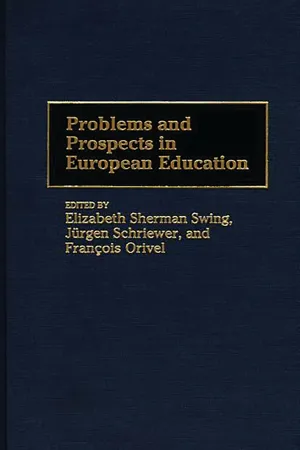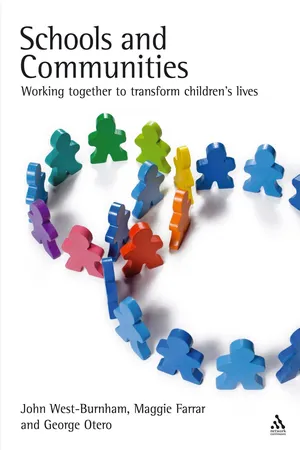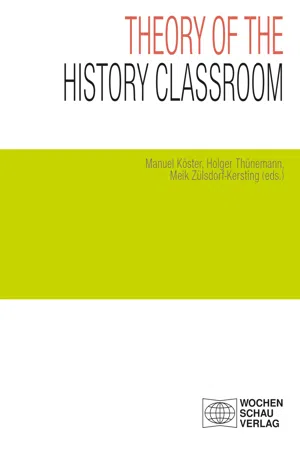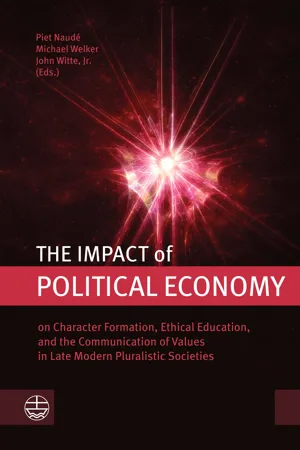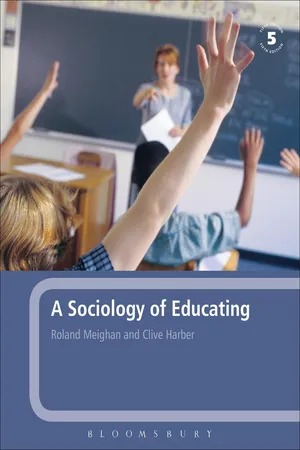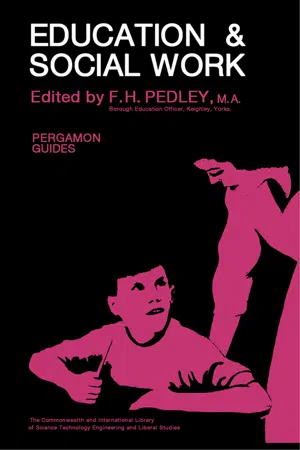Social Sciences
Education System
The education system refers to the structure and organization of formal education, including schools, curricula, and policies. It encompasses the processes and institutions through which students acquire knowledge, skills, and values. The education system plays a crucial role in shaping individuals' intellectual, social, and emotional development, as well as in contributing to societal progress and stability.
Written by Perlego with AI-assistance
Related key terms
1 of 5
10 Key excerpts on "Education System"
- eBook - PDF
Sociology
Made Simple
- Jane L. Thompson(Author)
- 2013(Publication Date)
- Made Simple(Publisher)
It has also been about exposing more and more youngsters for longer and longer to the experience of formal schooling. This develop-ment has been true of all industrialised societies for whom a highly organised Education System is a necessity. The more complex the socio-economic arrangements of society become, the more stress is laid upon the supportive and reflective roles of the Education System. The laymen's view of schoohng as 'a means of leaming subjects like maths, geography, French, e t c ' is only a part of the picture, and possibly not the most important part. Sociologists are more concerned with the functions which the Education System serves for society as a Education 89 whole, and to identify the contending interests which operate through the Education System. Perhaps it is easiest to look at this process in terms of four distinct functions—though of course, each is clearly related to all of the others. The four are the economic, the social, the political and that concerned with social control. Education and the Economic System A major responsibility of education is to provide the necessary workers for the prevailing system of production and level of technology which society requires. In a superficial way this may mean teaching the kind of subjects in schools which pupils will need to know in their future jobs, such as typing or technical drawing. But if you think about it, the content of most subjects taught in schools is very unrelated to the world of work. The relationship between the school curriculum and the needs of industry is more subtle than this. Rather, the school system acts as a kind of 'sorting-out agency' or 'clearing house' for employment, largely through the workings of its examination system. The old divisions into public, grammar, technical and secondary modem schools performed this function much more visibly, with each type of school preparing workers for a different level of future em-ployment. - eBook - PDF
- Will Gibson, Dirk vom Lehn(Authors)
- 2016(Publication Date)
- Bloomsbury Academic(Publisher)
88 5 Education Introduction Education institutions are some of society’s most powerful organs of socializations: aside from providing people with knowledge and skills they pro-duce social and cultural capital, access to job markets, and networks of friends and contacts that can stay with people through the entirety of their adult lives. This rather hyperbolic description is idealized in that it speaks about education as a set of ideals rather than a set of practices. Our interest in this chapter is in exploring the work that gets done in educational institutions such as kindergar-tens, schools, and universities, all of which are charged with organizing learning and teaching in some form or other. Formal education environments are not the only kind of institution that deal with learning, as many if not most institu-tions provide training to participants/employees, structure information for their members, and in this broad sense they can also be considered as sites of peda-gogy. Furthermore, learning, in the general sense of accumulating knowledge or developing understanding, is not only an institutional activity, as it can occur in all sorts of informal contexts such as conversations between friends and family or even in lone pursuits like reading or playing games. However, by their very nature of being ‘ institutions of education’, the sorts of environments we will be discussing here result in quite distinctive structures of activity and, as we shall see, their members face particular challenges. Education Systems around the world are in many cases complex collections of educational programmes. - eBook - PDF
- Francois Orivel, Jurgen Schriewer, Elizabeth S. Swing, Francois Orivel, Jürgen Schriewer, Elizabeth S. Swing(Authors)
- 2000(Publication Date)
- Praeger(Publisher)
The systems’ articulation, on the other hand, raised the issue of connecting hitherto uncoordinated institutional components with a view to constructing a rational “sequence,” or “ladder,” of successive levels of education. The structural outcomes of defining educational systems’ macro-organization can be conceived of, then, from the perspective of social theory, as ways of coping with divergent expectations and requirements, such as inclusion (by or- ganizing universal access to elementary schooling for all potential pupils) and selection (by channeling them consecutively into different tracks and levels); qualifying for universal communication across all fields of society and incul- cating differential “habitus” (Bourdieu 1970) as adapted to particular groups, trades, and areas of activity; and in more general terms, the educational system’s very functional orientation toward the encompassing society at large andits output performances related to other functionally specific subsystems, such as the economic system. As a consequence, the issue of defining an educational system’s macro-organization has always been closely associated with a nation’s public policy in general, and with its social, economic, and science policy in particular. This applied particularly to the construction of sequence between the ‘‘lower’’ or vernacular schools (e.g., the so-called English or German schools) and the “learned” or Latin-based establishments, between-to take up a graphic phrasing coined by Prost (1968)-“l’e‘cole du peuple” and “l’e‘cole des nota- bles. - eBook - PDF
Schools and Communities
Working together to transform children's lives
- John West-Burnham, Maggie Farrar, George Otero(Authors)
- 2007(Publication Date)
- Network Continuum Education(Publisher)
For the purposes of this discussion, schooling is defined as the formalized, commodified and bureaucratized component of education; in essence: Schooling is a necessary but not sufficient component of education. During the period of compulsory schooling, children and young people spend about 15 per cent of their life in schools. That time is powerful, fundamental and vital -yet, as Chapters 1 and 2 have demonstrated, it does not work equally well for all children. By the same corollary, access to education is also conditional on a wide range of factors. There are numerous formulations as to the nature of education and it is not the purpose of this chapter to add to the sum of human misery by proposing another formulation. For the purposes of this debate, however, it is proposed that an educated person is: 40 Education and the community literate, numerate and comfortable with information technology; capable of gathering, organizing and deploying information; able to analyse, synthesize and construct an argument to demonstrate understanding; able to think creatively and be comfortable with change, innovation and problem solving; confident about his or her own identity and value as a person and able to respect this in others; secure in personal relationships, able to work in groups and can contribute to the wider community; able to articulate personal values and spiritual understanding; able to demonstrate a deep respect for humanity and what it means to be human. There is no doubt that schools have a significant role to play in the achievement of these aspirations. However, as was demonstrated in Chapter 2, schools have a limited and often deeply constrained capacity to respond to this agenda. Quite apart from the potentially inhibiting impact of social factors, schooling, of itself, may actually inhibit educating. - Anna Wojciuk(Author)
- 2018(Publication Date)
- Routledge(Publisher)
The French example is particularly indicative of the ways in which educa-tional institutions at the primary, secondary, and university levels contributed to different institutional elements of the state. Such a return justified substantial 40 Education and the state-building process state expenses needed for the establishment of universal education. Archer con -tends (Archer 2013: 153–154) that the development of educational systems allowed the emergent states to create efficient bureaucracies, foster political loyalty, enhance military strength, and ensure economic expansion. For many governments, education was also a tool for managing rapid social changes during the nineteenth century. Though education served the state, the development of particular systems took place among a struggle between various influences and concepts as well as values and interests propagated by particular social groups; in fact, the process was not under complete control of the centre. In practice, the powerful ruling elite often sought to create an Education System that suited its various needs. During subsequent phases, networks composed of members of other groups that pursued different goals were incorporated into the process through mediation and compromises (Archer 2013: 161). As a result, in spite of certain common isomorphic elements, there are marked divergences between Education Systems. Their internal variety stems from the integration of various networks serving interests that differed from those of the groups that founded the systems. As subsequent, higher levels of education were integrated into the state systems, their internal variety decreased through standardisation. While the influence of powerful groups beyond the central, ruling stratum sufficed to ensure the maintenance of previous or appearance of alternative forms, the range and freedom of innovation was limited.- eBook - PDF
- Manuel Köster, Holger Thünemann, Meik Zülsdorf-Kersting(Authors)
- 2022(Publication Date)
- Wochenschau Verlag(Publisher)
Nevertheless, as a whole, class-room education can be defined as the effort to enable learning, and it is consti-tuted as a specific form from the point of view of systems theory . Because teach-ers teach and students learn, something unambiguously recognisable as classroom education is brought into existence via communication . For the history class-room, we may conclude that its specific form emerges from the concurrence of subject-specific expectations (of learning to think historically) and the improba-bility of understanding, according to systems theory . On the issue of processuality, one should note that teaching and learning occur on a “discontinuous continuum” . That means the classroom education at a school grade or level (e . g . primary) can be described as a continuum with multi-ple interruptions . So classroom education proceeds in stages; these are not chron-ological, but linked by mental efforts (cf . Petersen/Priesemann 1992, vol . 1, 36) . The unifying elements are in the content, goals, people involved, rules or out-comes . Krapp and Weidemann (2006, 615) define classroom education as a bun-dle of situations “in which professional teachers, acting within a certain institu-tional framework, with pedagogical intent and in an organised manner, initiate, support and facilitate learning processes” . Meseth et al . (2012, 234) discuss the “particular time of classroom education” . Luhmann (2002a, 108) distinguished “episodes” as fixed subject units and “periods” as organisationally prescribed units such as school periods, school days or school years . © Wochenschau Verlag, Frankfurt/M. 28 2.3.3 Systems theory and the history classroom One systems theory-based branch of research into classroom education has attended to the theoretical shortcomings of the ULO model . - eBook - PDF
The Impact of Political Economy
on Character Formation, Ethical Education, and the Communication of Values in Late Modern Pluralistic Societies
- Piet Naudé, Michael Welker, John Witte Jr., Piet Naudé, Michael Welker, John Witte Jr.(Authors)
- 2023(Publication Date)
- Evangelische Verlagsanstalt(Publisher)
Education What is education? Again, we encounter the question of definition. And again, I propose that we consider the implications of two views. The first view sees education as primarily concerned with the transmission of knowledge and the development of skills. This is a pragmatic or instrumental Jowett (St. Andrews: University of St. Andrews, 2012), bk. 9, 880d–e (Athenian Strang- er). 50 Exodus 20:2–17; Deuteronomy 5:6–21. 51 Matthew 22:35–40. 52 Oliver O’Donovan, “Government as Judgment,” First Things, Apr. 1999. 53 Smith, Wealth of Nations, bk. 1, chap. 10 (Glasgow ed.), 145. 54 The Australian States have established special standing commissions charged with re- sponsibility to investigate alleged misconduct and corruption within public agencies. But the commissions themselves are all too often found to have engaged in misconduct themselves. For a recent example (among many), see Tony Fitzgerald and Alan Wilson, Commission of Inquiry Relating to the Crime and Corruption Commission (Brisbane, 2022). Economics, Law, Education, and Religion 91 view of education. The goal of education is to fill children’s heads with facts and equip their hands with practical skills. Education exists to train the next gener- ation of workers. Its focus is on the particular role each person will perform within our society. On this view, education becomes more and more specialized, more and more vocationally oriented. Thus, by the time children are teenagers, we are already expecting them to decide their chosen vocation and to select the subjects they will study at school. Then we send them off to college or university to study accounting, engineering, marketing, or law. Now, it is not as if this vocational orientation doesn’t have its advantages. Occupational specialization enables a division of labor in which each person con- tributes to the good of society through the application of their knowledge and skills. - eBook - PDF
Management Under Differing Value Systems
Political, Social and Economical Perspectives in a Changing World
- Günter Dlugos, Klaus Weiermair, Wolfgang Dorow(Authors)
- 2019(Publication Date)
- De Gruyter(Publisher)
This paper attempts to explain divergencies of this kind focusing on social values and social value changes as the primary explanatory variables. The paper is organized as follows: part II will provide a discussion of economic factors linking education and employ-ment or the production and utilization of skills, part III will demonstrate the strategic importance of social values in the design of the Education System and, finally, part IV will briefly discuss implications of social value differences with respect to the structure and performance of organization-external and -internal labour markets. II We shall start our discussion of linkages between education and labour or the education- and employment-system by first analyzing economic properties of qualifications which in the Values and Education and Labour Markets 181 main are produced through the system of education. Subse-quently, we will describe typical adjustments and adaptations of firms and individuals to the availability of alternate forms and levels of human capital. Qualifications obtainable within a given social system of education (learning and training) are linked to the system of employment and, hence, to the internal allocation of labour within employing organizations, through three distinct elements or characteristics. These are: 1) cognitive and noncognitive skills produced through education and training and destined for ultimate utilization in employment, 2) information about skill levels and skill proficiencies and its availability to both the potential employer and the skill holder, and finally, 3) social qualifications acquired as joint products of schooling or training through various forms of socialization processes, which yield alternative attitudes and values with respect to work and work organization. - eBook - PDF
- Roland Meighan, Clive Harber(Authors)
- 2007(Publication Date)
- Continuum(Publisher)
The implications for schools and universities, as organizations, are unending. But what kind of activity did this kind of attitude generate at the empirical level? Essentially, the major interest was with identifying and mapping inefficiencies in the Education System to sort, train and allocate individuals. This interest influenced what was taken to be the main problem area for sociologists of education, the main properties to be studied in pursuit of a 294 Social Systems, Structures and Functions solution to this problem area and the main methods judged as appropriate for such investigation. The Problem The problem was to investigate why the Education System was failing to draw upon and use 'pools of ability' conceptualized along social class lines. For the economy to reach optimum development and growth, it needed a steady supply of skilled and flexible personnel, yet it appeared to observers in the 1950s and 1960s that large numbers of able pupils, mostly from working-class backgrounds, were failing to achieve satisfactory standards in the primary schools, were being excluded from entry to the academic sectors of secondary education because of their inability to satisfy the 11+ entry examination requirements, were not being entered for or were failing in public examinations and certificate assessments, were leaving school early, were failing to gain places in higher education and were entering semi-skilled or unskilled employment after completing their formal education. Explanations Explanations of this problem were conceived, as the perspective demanded, in terms of dysfunctions either in the internal structural organization of the Education System or in the structural relationships between education and other social subsystems. - eBook - PDF
Education and Social Work
The Commonwealth and International Library:Pergamon Educational Guides
- F. H. Pedley(Author)
- 2014(Publication Date)
- Pergamon(Publisher)
Also recom-mended, In-service training of teachers, particularly secondary school teachers, to develop an awareness of the child as a total personality, not as an IQ, only. A SOCIO-EDUCATIONAL SYSTEM 45 gaps, and actively to promote the interfunctioning of schools with homes and the local community.* Such an integrating body must itself be essentially flexible: its task can never be finalized. The socio-educational system itself must go on evolving, changing as the problems change, and the forces and factors acting upon human beings alter. It is not enough to see what needs doing: we must act in the knowledge that the future is not simply a projection of past trends, but is also an outcome of what in our time we do to shape it.f REFERENCES 1. HEMMING, J., Educating Man for Modern Society, New Society, April, 1959. 2. WINNICOTT, D. W., The Child, the Family and the Outside World, Tavistock Publications. 3. DOUGLAS, J. W. B., The Home and the School, MacGibbon & Kee. FLOUD, J. and HALSEY, A. H., Homes and Schools, Educational Research, Vol. 3, No. 2. WALL, W. D., SCHONELL, F. J. and OLSEN, W. C , Failure in School, Unesco, Hamburg. 4. BAKER, J., Children in Chancery, Hutchinson. 5. MUSGROVE, F. and TAYLOR, P. H., Teachers' and Parents' Conception of the Teacher's Role, Brit. Journal of Ed. Psychology, Vol. 35, Pt. 2. 6. GESELL, A. and ILG, F. L., The Child from Five to Ten, Hamish Hamilton. 7. RIDGWAY, L. and LAWTON, I., Family Grouping in the Infants' School, Ward Lock. 8. WILLIAMSON, G. S. and PEARSE, I. H., Science, Synthesis and Sanity, Collins. 9. PATERSON, N., et al., Experiments in Education at Sevenoaks, Constable Young Books, Ltd. 10. TANNER, J. M., Education and Physical Growth, University of London Press. 11. WALL, W. D., Education and Mental Health, Unesco, Harrap. Also Report of a Working Party on the Youth Employment Service (Albermarie), H.M.S.O.
Index pages curate the most relevant extracts from our library of academic textbooks. They’ve been created using an in-house natural language model (NLM), each adding context and meaning to key research topics.

